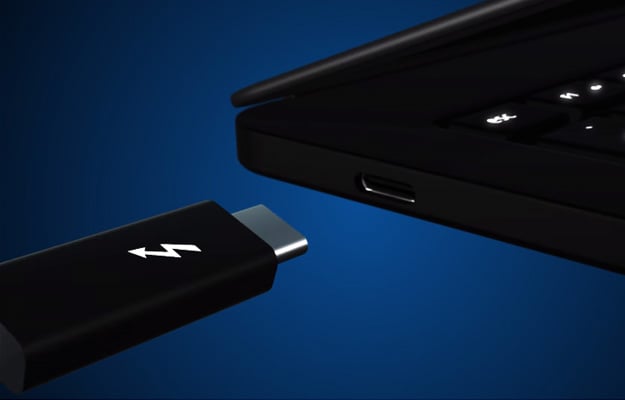Intel To Integrate Thunderbolt 3 In Future Processors And Make Protocol Royalty Free
Just about every electronic device on the planet supports USB connectivity, and that is especially true when it comes to PCs. If we could time travel into the not-too-distant future, there is a good chance that USB Type-C ports will be just as ubiquitous as USB Type-A ports are now. It is almost inevitable now that Intel has announced plans to integrate Thunderbolt 3 into its future processors.
Not only will future Intel chips support USB-C, Intel is going the extra mile by releasing the Thunderbolt protocol specification to the industry free of charge. That is a very big deal—with no royalties in play, industry partners are free to fully embrace USB-C. Furthermore, it will no longer be a proprietary standard, joining the likes of USB, PCI-Express, and other open industry standards.
"Intel’s vision for Thunderbolt was not just to make a faster computer port, but a simpler and more versatile port available to everyone. We envision a future where high-performance single-cable docks, stunning photos and 4K video, lifelike VR, and faster-than-ever storage are commonplace. A world where one USB-C connector does it all – today, and for many years to come," Intel stated in a blog post.
Looking ahead, Intel's envisions computer manufacturers building thinner and lighter systems that utilize only USB-C ports. With the ability to both charge devices and transfer data at high speeds, USB-C represents a logical evolution in external connectivity. And by integrating support into the CPU, implementing USB-C means not having to use a discrete component, which in turn means less board space and lower power requirements.

Intel's move also has the support of Microsoft.
"Microsoft and Intel are working together to enable Thunderbolt 3 on Windows PCs to deliver on the ‘if it fits, it works’ potential of USB-C," said Roanne Sones, general manager, Strategy and Ecosystem for Windows and Devices at Microsoft. "The Windows 10 Creators Update enhanced plug-and-play support for Thunderbolt 3 devices, with additional enhancements planned for future OS releases."
It has been a somewhat bumpy road for USB-C. It first arrived in 2009 as Light Peak with support from Apple before later morphing into Thunderbolt. With the introduction of Thunderbolt 2, Intel was able to double the theoretical speed ceiling from 10Gbps to 20Gbps, but it remained a proprietary spec. As such, vendors have never been real eager to adopt Thunderbolt connectivity.
Fast forward to today and the Thunderbolt 3 spec with USB-C connectivity has a theoretical speed ceiling of 40Gbps. It's faster than the USB 3.1 Gen2 standard, but still costly to implement. With Intel removing that barrier, vendors have little reason not to adopt the standard moving forward.
Thumbnail Image Source: Delock
Not only will future Intel chips support USB-C, Intel is going the extra mile by releasing the Thunderbolt protocol specification to the industry free of charge. That is a very big deal—with no royalties in play, industry partners are free to fully embrace USB-C. Furthermore, it will no longer be a proprietary standard, joining the likes of USB, PCI-Express, and other open industry standards.
"Intel’s vision for Thunderbolt was not just to make a faster computer port, but a simpler and more versatile port available to everyone. We envision a future where high-performance single-cable docks, stunning photos and 4K video, lifelike VR, and faster-than-ever storage are commonplace. A world where one USB-C connector does it all – today, and for many years to come," Intel stated in a blog post.
Looking ahead, Intel's envisions computer manufacturers building thinner and lighter systems that utilize only USB-C ports. With the ability to both charge devices and transfer data at high speeds, USB-C represents a logical evolution in external connectivity. And by integrating support into the CPU, implementing USB-C means not having to use a discrete component, which in turn means less board space and lower power requirements.

Intel's move also has the support of Microsoft.
"Microsoft and Intel are working together to enable Thunderbolt 3 on Windows PCs to deliver on the ‘if it fits, it works’ potential of USB-C," said Roanne Sones, general manager, Strategy and Ecosystem for Windows and Devices at Microsoft. "The Windows 10 Creators Update enhanced plug-and-play support for Thunderbolt 3 devices, with additional enhancements planned for future OS releases."
It has been a somewhat bumpy road for USB-C. It first arrived in 2009 as Light Peak with support from Apple before later morphing into Thunderbolt. With the introduction of Thunderbolt 2, Intel was able to double the theoretical speed ceiling from 10Gbps to 20Gbps, but it remained a proprietary spec. As such, vendors have never been real eager to adopt Thunderbolt connectivity.
Fast forward to today and the Thunderbolt 3 spec with USB-C connectivity has a theoretical speed ceiling of 40Gbps. It's faster than the USB 3.1 Gen2 standard, but still costly to implement. With Intel removing that barrier, vendors have little reason not to adopt the standard moving forward.
Thumbnail Image Source: Delock


